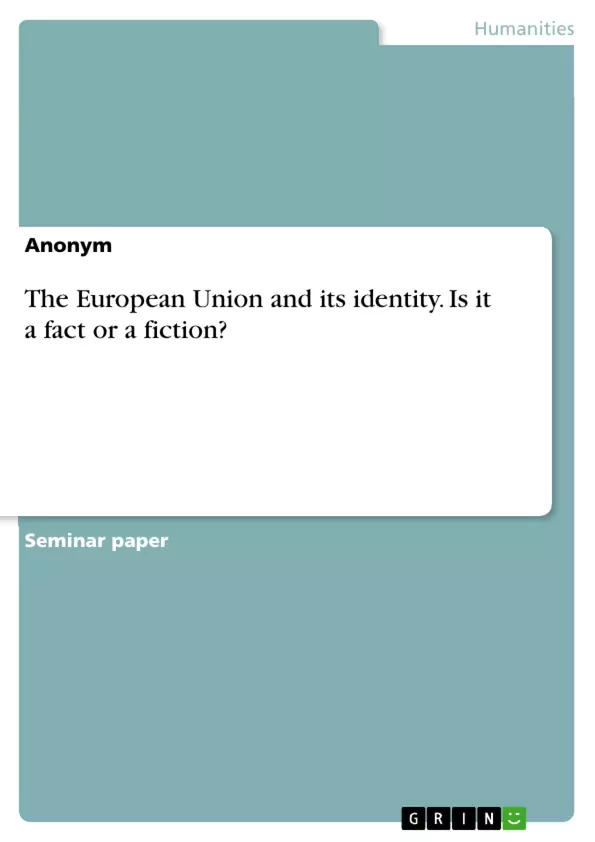The fundamental task of this paper is to answer the question whether European identity exists.
Since the beginning of the 21st century, being other or vanguard has become something normal, it is even modern to stand out and be perceived as different from the crowd. Every country’s cultural landscape has become more various than it was ever before and this is due to processes of globalization, taking place all over the world. One cannot argue that this development has brought many advantages mostly in the areas of transportation, tourism, media and communication.
It is now much easier than 50 years ago to travel, get to know other places and cultures and this fact has contributed for the spread of more broad-minded views on life. Another important and still on-going progress is the enlargement of the European Union, whose main intention is not only creating a universal single European market, but aims at building and strengthening a modern European community with its own identity. Expanding the EU means taking in new cultures with specific practices and lifestyles and this is one of the emblematic characteristics of the EU-multiculture.
The aim of this paper is to investigate whether such an identity exists, do we actually need it so that we feel part of Europe and how the EU forms the concept of European identity.The first part of the paper will include definitions of the important concepts in order to achieve a better understanding of what exactly ,,Europe” is and how we define ,,identity”. These are questions of increased difficulty, which remain without a definite answer and make the analysis of the EU and identity equally hard both on the expert and political level, as in the context of everyday life.
The second part will concentrate on the main theories and opinions which investigate the problematic nature of the European identity, next a short empirical part will outline the public opinion of the member states of the EU concerning European identity, specific example will be given with two Post-Soviet countries, namely Bulgaria and Poland.
Inhaltsverzeichnis (Table of Contents)
- Introduction
- Definitions
- What is Europe?
- What is identity?
- The European Union and European identity
- Why is Europe different?
- What unites us?
- The European Union and the need for a European identity
- European identity- mission impossible?
- Empirical findings on European identity
Zielsetzung und Themenschwerpunkte (Objectives and Key Themes)
This paper aims to investigate the existence and necessity of a European identity, exploring how the European Union shapes this concept. The analysis will focus on defining key terms, examining the EU's role in identity formation, and exploring empirical findings on European identity, particularly in post-Soviet countries.
- Defining "Europe" and "identity"
- The European Union's impact on European identity
- The role of multiculturalism in shaping a European identity
- Empirical evidence on public perception of European identity
- Challenges and opportunities for a unified European identity
Zusammenfassung der Kapitel (Chapter Summaries)
- Introduction: The introduction establishes the context for the paper, highlighting the increasing significance of multiculturalism and the European Union's role in shaping a modern European community. It outlines the paper's objectives and structure, emphasizing the investigation into the existence and necessity of a European identity.
- Definitions: This chapter provides a comprehensive understanding of the terms "Europe" and "identity." It explores the challenges in defining Europe due to its historical and political complexities, contrasting its geographical and institutional aspects. It delves into the multifaceted nature of identity, encompassing personal, national, and regional identities, highlighting the importance of cultural construction and maintenance in shaping identity.
- The European Union and European identity: This section examines the European Union's role in shaping European identity. It discusses the distinct characteristics of Europe and the European Union, highlighting its uniqueness as a political unit. It analyzes the process of European integration and its impact on the development of a shared identity, considering the challenges posed by the inclusion of new member states.
Schlüsselwörter (Keywords)
The paper focuses on the concepts of European identity, multiculturalism, the European Union, cultural politics, and empirical research on public perceptions. Key themes include the challenges and opportunities in creating a unified European identity within a diverse and evolving European community.
Frequently Asked Questions
Does a unified European identity exist?
The paper investigates this complex question, exploring whether European identity is a factual reality or a political fiction shaped by the EU.
How does globalization affect European culture?
Globalization has made cultural landscapes more diverse, facilitating travel and communication, which contributes to more broad-minded views on life.
What is the EU's role in building a European community?
Beyond a single market, the EU aims to strengthen a modern community with its own identity by integrating diverse cultures and lifestyles.
Why is it difficult to define "Europe"?
Defining Europe is hard due to its historical and political complexities, contrasting its geographical borders with its institutional and cultural aspects.
What are the empirical findings on identity in Poland and Bulgaria?
The paper examines public opinion in these post-Soviet countries to see how citizens balance their national identity with a sense of being European.
- Quote paper
- Anonym (Author), 2014, The European Union and its identity. Is it a fact or a fiction?, Munich, GRIN Verlag, https://www.grin.com/document/455462



